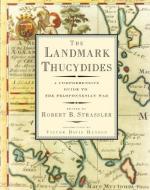|
This section contains 137 words (approx. 1 page at 300 words per page) |
c. 471-401 B.C.
Greek historian known for his eyewitness account of the plague that struck Athens in 429 B.C. at the outset of the Peloponnesian War (431-404 B.C.) "The bodies of dying men lay one upon another," Thucydides wrote, "and half-dead creatures reeled about in the streets. The catastrophe became so overwhelming that men cared nothing for any rule of religion or law." Thucydides himself suffered from the illness but recovered, and noted that survivors were able to tend the sick without catching the illness again. The epidemic, which claimed the life of the city's great leader Pericles (c. 495-429 B.C.), was undoubtedly the result of poor sanitation and over-crowding exacerbated by the war. As for the nature of the illness itself, modern scientists have variously identified it as typhus or influenza.
|
This section contains 137 words (approx. 1 page at 300 words per page) |


